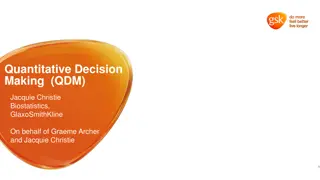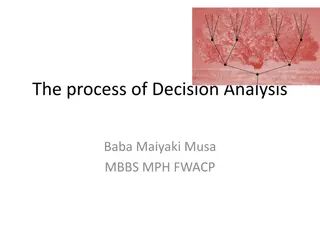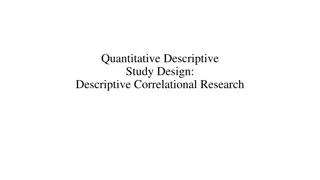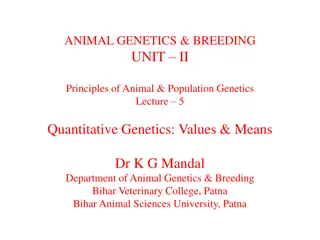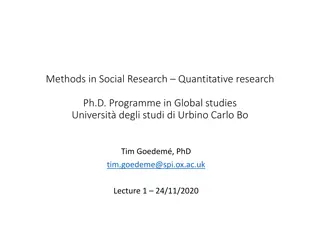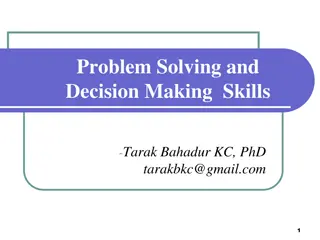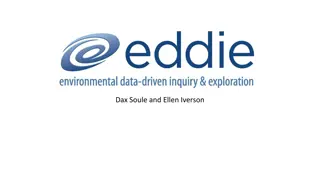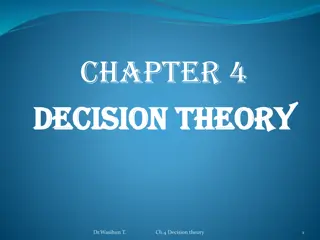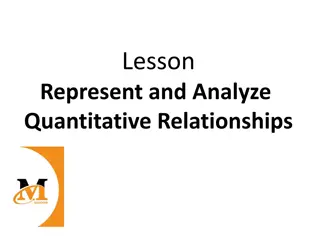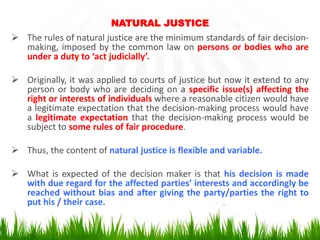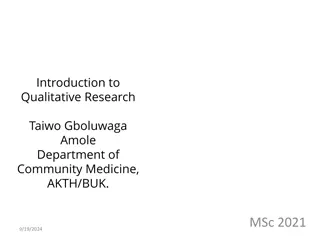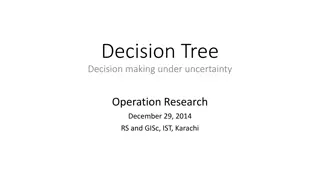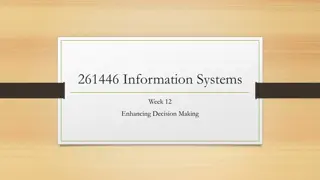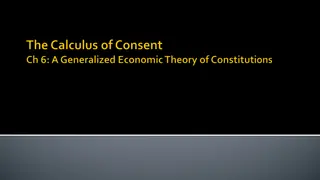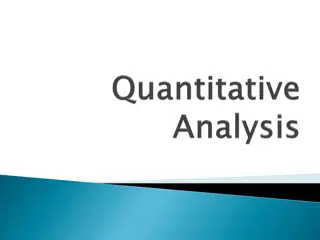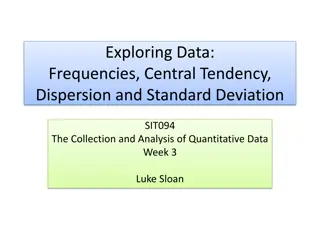Understanding Brain Development and Decision-Making Skills
Explore the fascinating realm of brain development and decision-making skills, focusing on how different brain regions activate during decision-making, the evolution of decision-making abilities from adolescence to adulthood, the importance of practicing decision-making skills, and the influence of
6 views • 10 slides
Overview of Research Process and Quantitative Research Phases
The research process involves steps like identifying, locating, assessing, and analyzing the research question to find answers. It includes quantitative and qualitative approaches, with specific phases like conceptual, design, empirical, analytic, and disseminating phases in quantitative research. E
9 views • 27 slides
Understanding Quantitative and Qualitative Research Methods
Exploring the differences between quantitative and qualitative research methods, this content delves into the importance of qualitative research, various methodologies such as focus groups and interviews, data collection, research ethics, and analysis techniques. It also covers the elements of the r
4 views • 43 slides
Making Informed Decisions in Environmental Science
Values play a crucial role in environmental decision-making. Scientific research is essential in addressing environmental issues, but understanding values is necessary before research can begin. This article discusses how values impact environmental decision-making and introduces an environmental de
0 views • 22 slides
Enhancing Career Decision Making Process
Explore the importance of good decision-making, types of decision makers, problems faced in decision making, readiness factors for career decisions, decision-making processes, and the CASVE cycle. Understand the significance of effective decision-making skills and how they impact our lives.
0 views • 26 slides
Understanding Quantitative Decision Making in Biostatistics
Quantitative Decision Making (QDM) in biostatistics enables optimal design of development plans and studies, quantifies decision risks, and minimizes bias. It involves setting targets and evidence levels, anchoring outcomes against targets, and establishing evidence thresholds for positive and negat
0 views • 27 slides
Operations Planning and Control: Forecasting Methods Overview
Forecasting is a crucial process in operations management, involving the estimation of future events based on past and present information. This chapter covers the significance of forecasts, characteristics of forecasting, role in decision-making, various forecasting methods (qualitative and quantit
3 views • 74 slides
Understanding Decision Analysis in Work-related Scenarios
Decision analysis plays a crucial role in work-related decision-making processes, helping in identifying decision makers, exploring potential actions, evaluating outcomes, and considering various values involved in the decision. This module delves into the steps involved in decision analysis, provid
0 views • 76 slides
Contrasting Qualitative and Quantitative Traits in Genetics
Genetic traits in organisms can be qualitative or quantitative, with qualitative traits controlled by single genes and showing distinct variations, while quantitative traits are influenced by multiple genes and environmental factors, resulting in continuous variations. Qualitative genetics focuses o
0 views • 13 slides
Understanding Quantitative Research Design in Social Science
This content covers various aspects of quantitative research design, including descriptive and correlational studies, research design blueprint, robust research design considerations, and different types of research approaches. It emphasizes the characteristics, techniques, and terminologies associa
0 views • 24 slides
Understanding Quantitative Analysis for Decision Making in Management
Quantitative analysis is a crucial scientific approach for managerial decision-making, involving data manipulation to derive valuable information. This method encompasses problem definition, model development, and acquiring input data. Mathematical models, variables, and parameters play key roles in
0 views • 11 slides
Qualitative vs. Quantitative Approaches in Health Research
Exploring the different methodologies, paradigms, and methods used in health research, this content highlights the distinction between qualitative and quantitative designs. It covers research questions, aims, objectives, hypotheses, and various quantitative approaches such as experimental and observ
1 views • 28 slides
Understanding Quantitative Genetics Principles in Animal Breeding
Quantitative genetics focuses on the inheritance of characteristics based on degree rather than kind, compared to qualitative genetics. It involves polygenes controlling quantitative traits, which exhibit continuous variation and can be measured using metric units. Qualitative traits, on the other h
0 views • 22 slides
Comprehensive Guide to Decision Making and Creative Thinking in Management
Explore the rational model of decision-making, ways individuals and groups make compromises, guidelines for effective decision-making and creative thinking, utilizing probability theory and decision trees, advantages of group decision-making, and strategies to overcome creativity barriers. Understan
0 views • 30 slides
Understanding Quantitative Research in Social Studies: A Comprehensive Overview
An in-depth exploration of quantitative research methods in social studies, covering concepts, data analysis, survey techniques, causality identification, and setting up research projects. Emphasizes the importance of grasping strengths, pitfalls, and key points in quantitative research and understa
0 views • 51 slides
Mastering the Art of Decision Making: Problem Solving Strategies
Explore the essence of decision making and problem-solving through a comprehensive session outline. Understand the importance, conditions, styles, processes, and ethical considerations in decision making. Learn how identifying problems, finding solutions, and implementing them are crucial steps in t
0 views • 42 slides
Understanding the Decision-Making Process
Decision-making is the process of selecting the best course of action from multiple alternatives to achieve desired outcomes. It involves identifying decisions, gathering relevant information, and following a step-by-step process to make informed choices. Principles and steps like identifying the de
0 views • 31 slides
Problem Solving and Decision Making Skills Workshop Overview
Workshop on problem-solving and decision-making skills by Dr. Tarak Bahadur KC focuses on defining problems, recognizing reactions, explaining approaches, and identifying practices to improve decision-making ability. The content covers classification of decisions, decision-making processes, practice
0 views • 35 slides
Project EDDIE: Enhancing Student Quantitative Reasoning with Large Datasets
Project EDDIE focuses on improving student quantitative reasoning through inquiry-driven exploration of complex datasets. The project aims to support instructors in guiding students to enhance their understanding of scientific concepts and quantitative skills. With a commitment to community and lear
0 views • 6 slides
Introduction to Decision Theory in Business Environments
Decision theory plays a crucial role in business decision-making under conditions of uncertainty. This chapter explores the key characteristics of decision theory, including alternatives, states of nature, payoffs, degree of certainty, and decision criteria. It also introduces the concept of payoff
0 views • 41 slides
Understanding Decision Trees in Machine Learning with AIMA and WEKA
Decision trees are an essential concept in machine learning, enabling efficient data classification. The provided content discusses decision trees in the context of the AIMA and WEKA libraries, showcasing how to build and train decision tree models using Python. Through a dataset from the UCI Machin
3 views • 19 slides
Understanding and Representing Quantitative Relationships
Explore how to represent and analyze quantitative relationships using graphs, tables, and equations. Practice with unit rates, plotting points in a coordinate plane, and understanding independent and dependent variables. Develop skills in creating equations, tables, and graphs to model relationships
0 views • 120 slides
Group Decision-Making: The Wisdom of Crowds and Stupidity of Herds
This presentation by Richard Zeckhauser of Harvard University delves into the importance of rational analysis and subjective probability in group decision-making processes. It emphasizes the need to focus on collective wisdom while avoiding biases that can affect group decisions. Key concepts covere
2 views • 22 slides
Understanding Costs and Revenues for Decision Making
This webinar covers various aspects of cost analysis and revenue calculation essential for decision-making, such as contribution margin, break-even analysis, target profit, contribution to sales ratio, margin of safety, and using break-even analysis in decision-making. Through examples like calculat
1 views • 39 slides
Supported Decision Making as an Alternative to Guardianship
Explore the concept of Supported Decision Making as an alternative to guardianship, addressing the needs of individuals who may require assistance in decision-making. Understand the importance of listening to the incapacitated person, identifying their preferences, choices, and best interests. Learn
4 views • 42 slides
Understanding Natural Justice in Legal Decision-Making
The concept of natural justice sets forth the minimum standards of fair decision-making, applicable to anyone making decisions impacting individual rights. It emphasizes unbiased decision-making, fair procedure, and giving parties a chance to present their case. The duty to act fairly requires decis
0 views • 23 slides
Should Assisted Suicide be Legalized in China? Decision-making with Six Thinking Hats
The content discusses the decision-making process using the Six Thinking Hats method to determine whether assisted suicide should be legalized in China. Various tools and sessions are highlighted, guiding participants through considering different viewpoints, analyzing arguments, and making an infor
0 views • 12 slides
Understanding Research Methods in Public Health
Exploring the nuances of qualitative and quantitative research methods in the context of public health, this content delves into how each approach offers unique insights and perspectives. It discusses the importance of qualitative research in uncovering underlying factors influencing health, interpr
0 views • 77 slides
The Assisted Decision-Making (Capacity) Act 2015 in the Criminal Justice Context
The Assisted Decision-Making (Capacity) Act 2015 introduces key reforms such as the abolition of wards of court system for adults, a statutory functional test of capacity, new guiding principles, a three-tier framework for support, and tools for advance planning. It emphasizes functional assessment
0 views • 17 slides
Implementing Group Decision-Making Tools with Voting Procedures at Toulouse E-Democracy Summer School
Decision-making in organizations is crucial, and group decision-making can lead to conflicts due to differing views. Group Decision Support Systems (GDSS) are essential for facilitating decision-making processes. The Toulouse E-Democracy Summer School discusses the implementation of voting tools in
0 views • 21 slides
Decision Analysis: Problem Formulation, Decision Making, and Risk Analysis
Decision analysis involves problem formulation, decision making with and without probabilities, risk analysis, and sensitivity analysis. It includes defining decision alternatives, states of nature, and payoffs, creating payoff tables, decision trees, and using different decision-making criteria. Wi
0 views • 27 slides
Utilizing Six Thinking Hats for Enhanced Decision Making and Problem Solving
Exploring the concept of Lateral Thinking through the Six Thinking Hats technique, this article delves into how this approach by Edward de Bono can revolutionize decision-making processes. By understanding the objectives and roles of each colored hat - Blue, Red, Yellow, Black, Green, and White - in
0 views • 12 slides
Introduction to Operations Research in Business Applications
Operations Research (OR) is a scientific approach to decision-making that focuses on finding the best solutions under various constraints and objectives. Originating from World War II military operations, OR models help optimize resources in industries like defense, agriculture, and healthcare. This
0 views • 20 slides
Decision Making Under Uncertainty Using Decision Trees
In this scenario, Colaco faces the decision of whether to conduct a market study for their product, Chocola. The decision involves potential national success or failure outcomes, along with the consequences of a local success or failure from the market study. By utilizing decision trees, this comple
10 views • 7 slides
Enhancing Decision Making with Information Systems
Explore the role of information systems in enhancing decision-making processes within organizations. Topics include business intelligence, types of decisions, decision-making processes, and managerial roles. Learn about structured, unstructured, and semi-structured decisions, different models of man
0 views • 21 slides
Quantitative Research Framework for Historical Disciplines
Scholarly communities in historical disciplines are combining quantitative and qualitative methods to study phenomena that change over time. The proposed general methodological reflection aims to enhance research in historical linguistics through quantitatively driven models and claims. Quantitative
0 views • 18 slides
Decision Making and Constitutional Rules Behind the Veil of Ignorance
In decision-making for collective actions, individuals behind a veil of ignorance need constitutional rules to govern future decisions. The choice of rules, the expected external costs, and decision-making costs play a crucial role in determining the optimal decision-making rule. By minimizing total
0 views • 16 slides
Understanding UV-Visible Spectrophotometry for Quantitative Analysis
Spectrometry in quantitative analysis involves determining substance concentration through spectrophotometry. UV-Visible Spectrophotometry measures light absorption in the UV or visible region using the Beer-Lambert Law, relating absorbance to substance concentration. The electromagnetic spectrum en
0 views • 15 slides
Empowering Through Quantitative Literacy: A Roadmap to Mathematical Empowerment
In a modern society filled with data and statistics, quantitative literacy is essential for individuals to think critically, question authority, and make informed decisions. The ability to understand and engage with mathematical concepts is crucial for addressing complex issues and thriving in today
0 views • 15 slides
Understanding Quantitative Data Analysis in Research
Dive into the world of quantitative data analysis with a focus on frequencies, central tendency, dispersion, and standard deviation. Explore the collection and analysis of numerical data, levels of measurement, and methods for quantifying social concepts. Learn about the importance of capturing data
0 views • 25 slides





